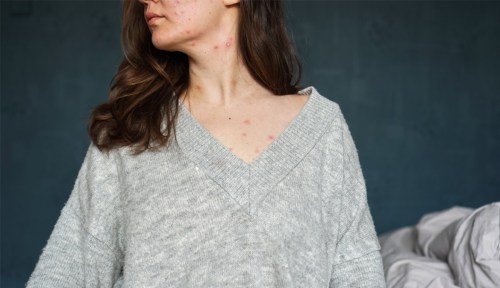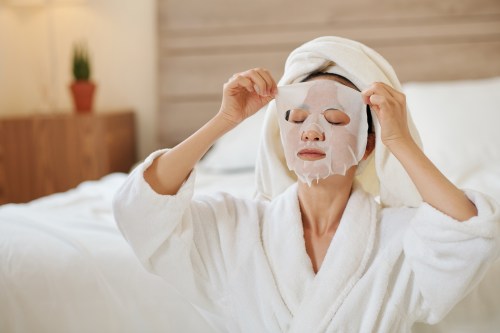As we navigate difficult jobs, tricky schedules, and never-ending to-do lists, we sometimes get used to the feeling of being stressed. But just because you’ve learned to deal with this stress mentally, it doesn’t necessarily mean your body is convinced, explains Sharleen St. Surin-Lord, MD, a board-certified dermatologist in Washington DC. And often, the effects appear on your face.
Experts in This Article
board-certified dermatologist and hair specialist at Visage Dermatology
“If you have a stressful job, or you’re always on deadlines, or you travel a lot, you have learned to cope with stress. However, your body will always talk to you, and your skin will always tell on you,” says Dr. St Surin-Lord, who practices integrative dermatology. She often has patients who say they “don’t feel stressed,” but once she digs a bit deeper, she learns that their job is super demanding, they’re not sleeping well, and it’s difficult to keep up with their kids’ schedules. “I’ll say, ‘So you are under stress. You’ve learned to deal with it and cope with it, but the fact that your seborrheic dermatitis is so bad that you have a snowstorm going on on your shoulders with flakes tells me that you’re stressed,'” she says.
Stress causes a surge of hormones (namely, adrenaline and cortisol), which trigger inflammation in the body. So if you already manage inflammatory conditions like acne, eczema, psoriasis, or seborrheic dermatitis, stress can cause them to flare up. You may also notice issues you don’t normally deal with, like hives.
This Parisian Skincare Brand Is Launching in the United States for the First Time—Here’s What a Derm Wants You to Know

We’re Calling It: Cleansing Balms Are the Face Wash of the Future—Here Are 3 to Add to Your Cart

This Is the One Product That Scarlett Johansson Always Keeps in Her Purse and on Her Bedside Table

If you’re experiencing these issues, the treatment is twofold. First, you need to consult your doctor to address what’s going on with your skin. “If you’re someone whose skin is breaking out, their eczema’s worsening, or their psoriasis is worsening due to stress, you’re going to need some medicine, like topical steroid creams or lotions,” says Dr. St. Surin-Lord. “If you find yourself breaking out into hives every other day or every day, you might need to take an antihistamine… And I recommend seeing an allergist to see how to calm that down as well.”
Beyond just treating the symptoms, you’ve got to get to the core of the issue and manage your stress. “If that stressor is still there and you take away the [medication] after two weeks, you’re just going to break out all over again,” says Dr. St Surin-Lord.
She suggests looking for activities—like walking and meditation—that will help bring you joy. In extreme cases, she’s even had patients fill out Family and Medical Leave Act forms so that they could take a few weeks off of work to heal their skin. “And let me tell you: after two weeks off, their skin was clear,” she says.
If your skin is acting up, take a step back and evaluate your stressors. Managing stress is very different than simply learning to deal with it, and you’ve got to take time to figure out the former to properly heal aggravated skin.
Oh hi! You look like someone who loves free workouts, discounts for cutting-edge wellness brands, and exclusive Well+Good content. Sign up for Well+, our online community of wellness insiders, and unlock your rewards instantly.
Sign Up for Our Daily Newsletter
Get all the latest in wellness, trends, food, fitness, beauty, and more delivered right to your inbox.
Got it, you've been added to our email list.








